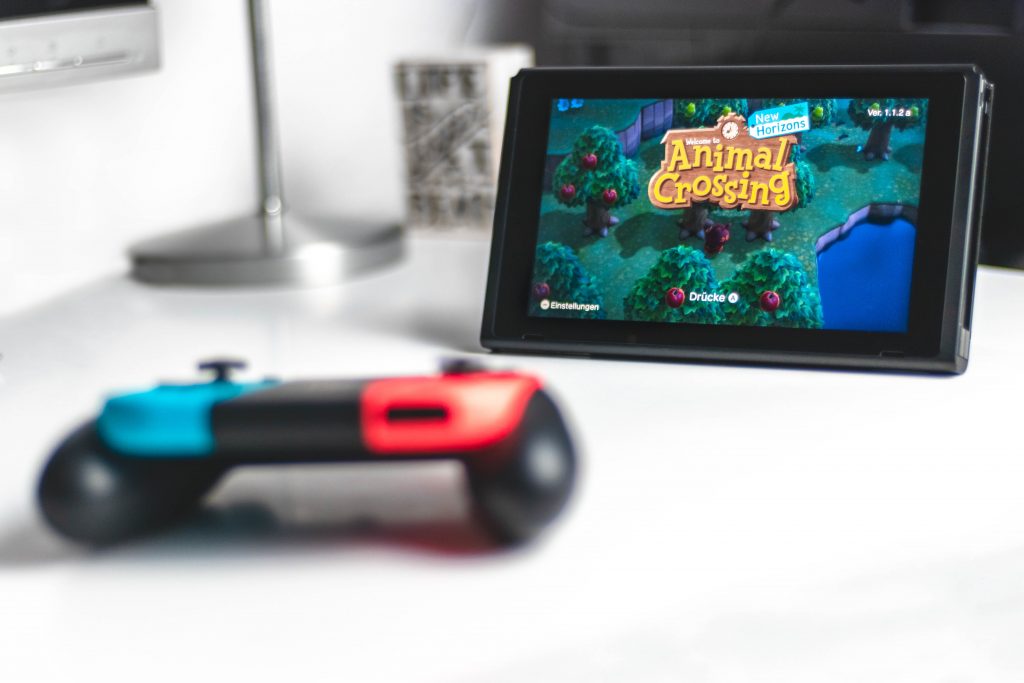We’d just received an email from the head of HR. “From Wednesday 18th of March,” it read, “the office will close, and all employees will be working from home indefinitely”. One colleague bit her lip. “Fuck,” she muttered. “Where am I going to get my loo roll from now?” Debbie and I were on very different wavelengths, it turned out. Whilst she was one of the many ravenously stockpiling resources, I – inexplicably and falsely confident that everything would be fine – was more concerned with how I was going to pass the time without friends, and shops, and trees. So I made virtual ones.
Nintendo was to release ‘Animal Crossing: New Horizons’ on its ‘Switch’ console that Friday, so as Debbie wrestled to secure for herself the last jar of Sainsbury’s Taste the Difference capers (you take what you can get), I managed to swipe the last available gaming device from the Curry’s across the road. My babe in arms, I ferried it home warily, guarded against the slew of half-masked strangers on the District line. I set it up and pre-downloaded the game that night, and when Friday came, it was like Christmas morning. I was dropped into a world in which I could manipulate natural resources for my benefit, pay off a mortgage in a few days, and, crucially, in which I was an adorable little man – all of which remain somewhat farfetched IRL. For weeks I worked doggedly and tactically: recruiting unassuming animals to repatriate themselves to my island nation; attempting to sate my avaricious landlord; and visiting friends (yes, real life ones) to swap apples for pears, as it were (as it literally was).
Before long, Treloaria was a developed civilisation of its own, with a bustling high street, chock-a-block museum, outdoor amphitheatre, beachside gym, and ‘Desperate Housewives’-inspired residential suburbs. I had terraformed my virtual paradise to my heart’s content, completing all seasonally occurring tasks (including those set by the terrifying bunny from Donnie Darko), and had even made it to my poorly attended surprise birthday party, wherein my neighbours, Cube the penguin and Wendy the sheep, pranced gaily around a centrally situated piñata.
“But it’s when I set down my ‘Switch’ that the bleakness came back into focus.”
In Treloaria, anything was possible. I had unrelenting omnipotence. I was god. The turnip market – a system designed to teach children lessons in trade and stocks, no doubt, but upon closer inspection reveals itself to be a rather unrealistic simulation that would certainly cripple even the most stable real-world economy – was putty in my hands, and I was earning upwards of 2 million bells a week simply by knowing where and when to buy and sell my shares. My bank account was brimming, my fountains were flowing, my islanders were smiling, and my world was at peace.
But it’s when I set down my ‘Switch’ that the bleakness came back into focus. I was sequestered to my house – my dad deemed ‘vulnerable’ by the NHS – with nothing to look forward to except, dishearteningly, the end of my temp contract. I was hemmed in, contained. Controlled. For a good reason of course – this wasn’t the product of the malicious manoeuvrings of an evil global corporation or alien invasion – yet it may have been something to do with the stark lack of a conscious, accountable enemy that removed any semblance of the personal agency I previously thought I had. It can come as a terrible shock to a narcissistic young woman recently spat out of the rear end of the education system: that you’re not really that important, and anyone who ever told you anything remotely resembling the opposite has been lying. So when Covid put 19 more spanners in the works, I, like so many others, felt like I’d been frozen in carbonate and forced into freefall.
“A fantasy defined by the notion that total command can bring happiness and stability in the face of ominous uncertainty.”
It’s not surprising then that ‘New Horizons’ has garnered the cultural capital it has, smugly sat at the top of the Nintendo eShop charts since release. You could see it as a kink: turning submission to dominance. A fantasy defined by the notion that total command can bring happiness and stability in the face of ominous uncertainty. But it’s reasonably well hidden. Some things – the weather; which villager turns up on moving day; which fake artworks Redd tries to sell you – are still enough out of the player’s control for it to masquerade as a game rather than a responsibility.
The key to the booming success of ‘Animal Crossing’ lies in its welding of this modified incarnation of the deific superiority cultivated by games like ‘The Sims’, with a more personalised quasi-RPG mentality whereby you progress through this idyllic social simulation not just as a character, but your own customisable self. Slathered, of course, with that charming layer of trademark Nintendo innocence, ‘New Horizons’ has become a cultural signpost for all we fear and desire in this nightmarish global moment. Not as nightmarish as that fucking bunny, though.
Daisy Treloar
Featured image courtesy of @stereophototyp via Unsplash.

